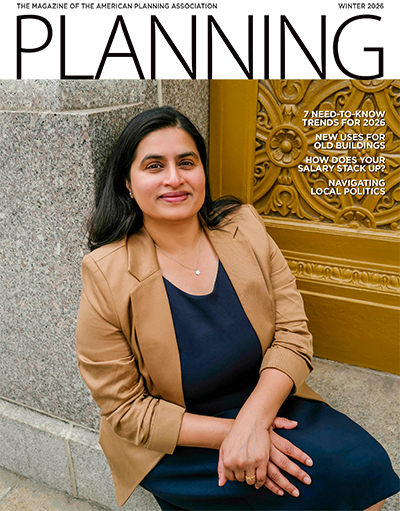Oct. 10, 2024
As another national election cycle inches to the finish line, a new documentary looks back four decades to remind viewers of a groundbreaking campaign that changed the face of politics in our cities.
Using archival footage, present-day interviews, and a great period-piece soundtrack to set the mood, director Joe Winston's Punch 9 for Harold Washington transports us back to the streets and election halls of Chicago in the 1980s to relive, remember, and reflect on the election of the city's first African American mayor.
The film will be of obvious interest to those studying the history of elections or the city of Chicago, but it also includes broader lessons about pluralism and public participation in diverse and often divided communities. Winston's pacing, tone, and level of analysis strikes a good balance that would make Punch 9 welcome viewing for a class in race, urban politics, and history — or just an enjoyable movie night for planners.
The story begins in 1976 with the unexpected death of Mayor Richard J. Daley, who ruled every aspect of life in the city for over 20 years. His name was synonymous with the concept of the political machine. But by the 1980s, in a city with over one million Black residents — many of whom came north during the great migration seeking safety, political freedom, and a fair shot at the American Dream — a change seemed long overdue. They hoped to shun the old lines of patronage and ethnic politics and to represent the changing demographic landscape.
The power vacuum left by Daley's death provided a new opportunity. After the short term of the city's first female mayor, Jane Byrne, a multipronged effort began to elect then congressman Harold Washington in 1983. He was a seasoned politician with the poise of a senior statesman on the national stage, the connections needed to run a hard campaign in the trenches, and the political acumen to strategize on multiple levels at once.
Hearing the call to service — and seeing the state of his city, which was fractured by segregation, decaying institutions, dilapidated public housing, and declining faith in government and city services — Washington rose to the challenge and mounted a campaign unlike any seen before: a new dawn for civic participation and democratic governance in a city once associated with the dark cloud of political corruption and machine rule.
Punch 9 delights in letting Washington speak for himself through extended footage of his speeches and many short quips and zingers caught on tape. We come to appreciate both sides of this remarkable man, a calm and well-spoken orator with a passion for 50-cent words, as well as a plainspoken, frank, often funny observer of politics who was unafraid to give a simple answer and speak truth to power when necessary.
The film also serves as an important reminder of previous struggles against police brutality and segregation, issues that have shaped urban politics since the 1920s and will continue to matter until they are truly addressed.
Winston does an admirable job holding the viewer's attention as Washington's campaign unfolds. The narrative highlights the tireless effort to confront both the city's established power structure and the pervasive sense of disappointment and apathy in the Black community. For the most part, the election will be won or lost not through catchy slogans or profound policy proposals but rather through the simple fundamentals of voter registration and turnout.
The election victory provides a high point in the middle of the film, leaving the second half to descend into unfortunate chaos and tragedy. Despite his stunning and well-coordinated upset, Washington's term in office was undermined by the obstructionist tactics of a group of aldermen determined to resist every effort to change the business-as-usual ways of the old guard. Borrowing from a different Washington, in the Broadway musical Hamilton, "Winning was easy. Governing's harder."
Learn more about screenings and home-viewing availability for Punch 9 for Harold Washington at www.punch9movie.com.
If you liked Punch 9 for Harold Washington, you may also enjoy ...
Double Trouble: Black Mayors, Black Communities, and the Call for a Deep Democracy (2005)

Written by J. Phillip Thompson III, a scholar with firsthand experience, this classic study provides a definitive account of the struggles, achievements, tradeoffs, and paradoxes of a generation of African Americans rising to power. Thompson managed the New York City Housing Authority and also served as director of the Mayor's Office of Housing Coordination under David Dinkins, New York City's first Black mayor, in the early 1990s. Double Trouble is available for purchase at Oxford University Press.
Street Fight (2005)
Harold Washington's election was as an important influence on a generation of Black mayors, including Cory Booker, who led a successful reform campaign in Newark, New Jersey, before he later became a U.S. senator. Street Fight, an Oscar-nominated documentary directed by Marshall Curry, shows Booker's knock-down, drag-out, bare-knuckles fight against four-term incumbent Sharpe James.
Street Fight is available to stream on Amazon Prime.
Harold (1997)
Airing on the 30th anniversary of Harold Washington's death, This American Life — the celebrated podcast — revisited his life and legacy. Weaving together interviews with contemporaries and scholars, host Ira Glass shines a light on Washington's revolutionary campaign and the changes it heralded in the politics of race in America.
Harold is available to download for free from This American Life.




